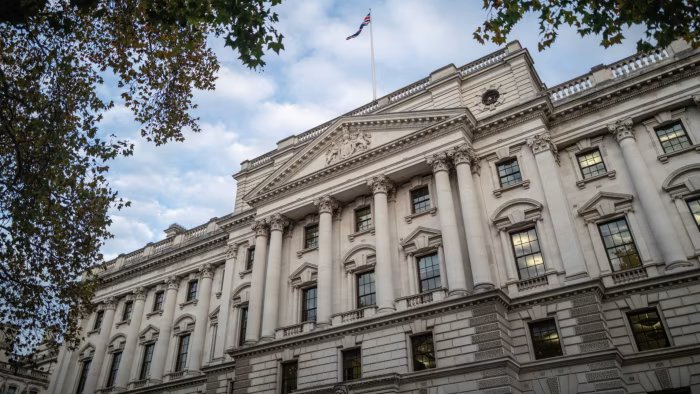Unlock the Editor’s Digest for free
Roula Khalaf, Editor of the FT, selects her favourite stories in this weekly newsletter.
Investors are anticipating a “radical” shift away from long-term borrowing by the UK government, after it said it was considering selling more short-term Treasury bills.
A consultation announced alongside Wednesday’s Budget will examine the possibility of “expanding and deepening” the market for Treasury bills, a form of government debt of less than one year in duration. With just £78bn in circulation, bills currently make up just a sliver of the £2.9tn in outstanding UK sovereign debt.
The UK has already been shortening the maturity of its debt — which at roughly 14 years on average is far longer than that of other countries — in a bid to lower its interest bill as demand for ultra-long-term bonds from pension funds wanes. Analysts said an expansion of the bills market is likely to accelerate that process.
“It adds to this view that there is a fairly radical shortening of the average maturity of gilt supply in future years,” said Moyeen Islam, an interest rate strategist at Barclays.
It is currently cheaper for the UK to issue short-term debt compared with long-term bonds. One-month Treasury bills currently yield 4.05 per cent, while 30-year yields have fallen to 5.21 per cent from a 27-year high of 5.75 per cent in September.
But leaning more heavily on short-term borrowing would leave the government more exposed to swings in interest rates as it would have to return to the market more frequently to refinance its debt.
Investors say the Treasury’s plans are a response to shifting demand, arguing that the unusually long maturity of UK debt makes little sense now that the private sector pension schemes that used to hoover up almost limitless quantities of long-term gilts are closed to new members and in decline.
“Creating more market depth at the short end can only be a good thing,” said Maya Bhandari, Emea multi-asset chief investment officer at US asset manager Neuberger Berman, adding that it would lessen the pressure on long-term gilts.
A bigger bills market should be a “deep, liquid cornerstone of any fixed-income curve”, said James McAlevey, head of global aggregate and absolute return at BNP Paribas Asset Management. He added that it was “only right” to tailor UK debt issuance to the changing needs of investors.

A great reliance on bills would echo a strategy pursued in the US in recent years, where such short-term instruments now account for a fifth of its $29tn in outstanding government debt, versus just 3 per cent in the UK.
US Treasury secretary Scott Bessent has continued this reliance on short-term financing, a Biden-era policy that he had previously criticised.
But while the vast US bills market caters to an established industry of money market funds — savings vehicles that invest in very low-risk and short-term securities — the UK lacks this kind of structural demand.
Francis Diamond, head of European rate strategy research at JPMorgan said the consultation was a “concrete step” towards a significant expansion of bill issuance. “The big question for me is: the [government] can bring the supply, but where is the natural demand?” he added.
The Debt Management Office, which conducts debt sales on behalf of the Treasury, said on Wednesday that the government was “committed to maintaining as diversified an investor base as possible” and that “any changes following the consultation will take into account an assessment of cost and risk, including implications for the government’s refinancing risk exposure”.
Analysts said larger and more regular issuance of bills could draw demand from banks looking for short-term liquid debt to use as collateral, and from providers of stablecoins — crypto tokens pegged to mainstream currencies that require safe debt to back them.
The Bank of England this month proposed that stablecoin issuers considered to be “systemically important” would be able to hold up to 60 per cent of their assets in short-term government debt, and the rest in bank deposits.


